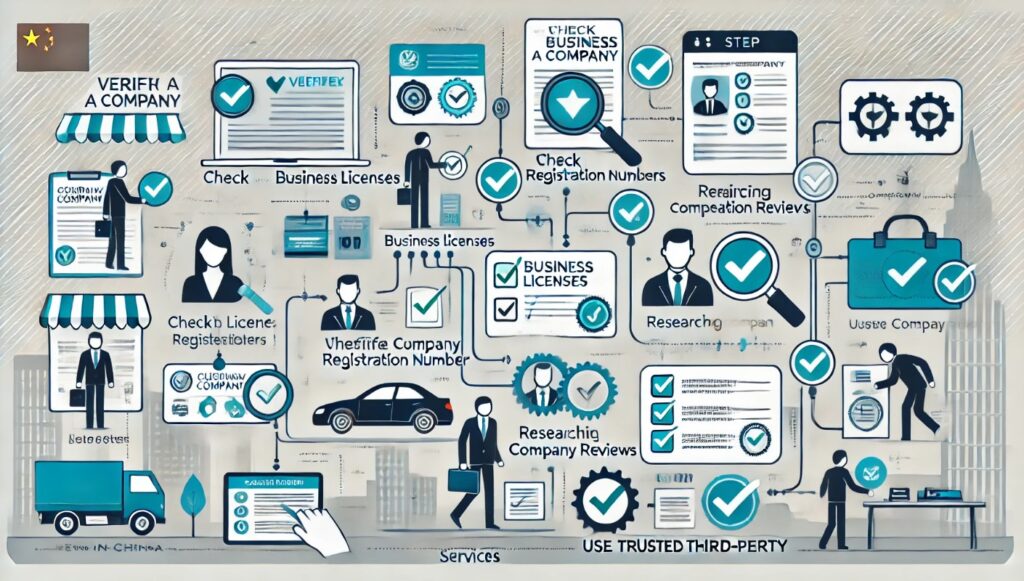How to Verify a China Company
Verifying a company in China is a crucial step for businesses and individuals who plan to engage in trade, investment, or partnerships with Chinese firms. With the rapid growth of China’s economy and its role as a major player in global trade, it’s essential to ensure that the company you are dealing with is legitimate, financially stable, and compliant with local laws and regulations. The process of company verification in China involves several steps, including checking the company’s registration status, evaluating its financial standing, confirming its legal compliance, and assessing its reputation.
Why Verifying a China Company is Important
Verifying a company in China is an essential part of due diligence, especially when engaging in partnerships, investments, or procurement. China’s business environment, while lucrative, can also be fraught with risks due to fraud, regulatory non-compliance, and counterfeit goods. Verifying a company helps businesses avoid these potential pitfalls and make informed decisions.
Risk Management in Business Transactions
One of the primary reasons for verifying a China company is to assess the risk involved in doing business with it. A company that is not properly registered or compliant with local laws could pose significant financial or legal risks.
- Avoiding Fraud: By verifying the company’s credentials, you can ensure that it is legitimate and prevent engaging with fraudulent companies.
- Legal and Financial Risks: Ensuring that the company follows local regulations helps avoid potential legal issues or financial losses.
- Reputation Protection: Working with reputable companies protects your brand and reputation in international markets.
Regulatory Compliance
China has a unique and evolving regulatory landscape. Verifying a company ensures that it complies with local laws, including licensing, tax obligations, and environmental standards. A company that is not in compliance could face penalties, lawsuits, or closure, which could, in turn, impact your business relationship.
- Licensing and Certifications: Verifying a company’s business license and certifications ensures that it is authorized to operate in its industry.
- Tax Compliance: Checking the company’s tax filings and obligations can help you understand its financial health and stability.
Financial Health Assessment
A China company’s financial standing plays a crucial role in determining whether it is a reliable partner for your business. Verifying a company’s financial health ensures that they can meet contractual obligations and manage their business operations effectively.
- Creditworthiness and Payment History: Evaluating the company’s credit score and payment history can give insight into its ability to honor debts and fulfill contracts.
- Asset and Liabilities Review: Assessing the company’s balance sheet can help you determine its financial health, risks, and stability.
How to Verify a China Company
Verifying a Chinese company involves several steps, which include confirming the company’s registration status, reviewing its financial background, checking its reputation, and evaluating its compliance with local laws. The following sections outline these verification steps in detail.
Reference: China Company Credit Report – Tang Verify
Checking the Company’s Registration Status
The first step in verifying a Chinese company is to confirm that it is legally registered to operate. In China, all businesses must be registered with the government, and they are assigned a business license that contains important information about the company’s legal structure and operations.
Company Registration Information
You can verify a company’s registration status by obtaining key details from its official business registration documents, such as:
- Business License: The business license contains the company’s registration number, legal representative, business scope, and other essential details.
- Registration Authority: Companies in China are registered with local government authorities, and you can verify a company’s registration status through government websites and databases.
Using Chinese Government Databases
The Chinese government maintains several public databases where you can verify a company’s registration status. These databases offer easy access to a company’s registration details, and in some cases, they may include legal issues or fines.
National Enterprise Credit Information Publicity System (NECIPS)
The National Enterprise Credit Information Publicity System is an official government platform that allows users to search for and verify company registration information in China. Through this platform, you can access the following details:
- Company’s Legal Status: Verify whether the company is legally registered and active.
- Ownership and Control: Information about the company’s shareholders, major stakeholders, and key management personnel.
- Licensing Details: Confirm whether the company has the necessary licenses to operate in its respective industry.
The NECIPS is an essential tool for anyone looking to verify the legitimacy of a company operating in China.
Local Regulatory Agencies
In addition to the national database, local regulatory agencies in Chinese provinces or cities also provide company registration information. These agencies oversee businesses within their jurisdictions and can help verify a company’s local compliance. Depending on the region, accessing these databases might require additional steps or contacts with local authorities.
Reviewing Financial Health and Creditworthiness
Once you have confirmed that a company is properly registered, the next step in the verification process is to assess its financial health. This helps to ensure that the company is financially stable and can meet its obligations.
Obtaining a China Company Credit Report
One of the most effective ways to assess a company’s financial standing is by obtaining a China company credit report. These reports provide an overview of the company’s financial health, including its credit score, payment history, and outstanding debts. Key information included in the report may cover:
- Company Credit Score: The company’s credit score provides a snapshot of its financial health and its ability to meet payment obligations.
- Outstanding Liabilities: The report will list any loans, debts, or financial obligations that the company currently has.
- Financial History: A history of the company’s financial performance, including revenue trends, profit margins, and debt levels.
Several third-party companies, including Dun & Bradstreet and CreditSafe, offer detailed credit reports for Chinese companies. Additionally, Chinese platforms like Qichacha and Tianyancha provide credit reports and financial assessments directly from local sources.
Supplier Audits and Financial Verification
Another critical step in verifying a China company is conducting a supplier audit, particularly when sourcing products or entering a business partnership. A supplier audit involves inspecting the company’s financial records, facilities, and operational practices.
- Factory Audits: A third-party audit firm can visit the company’s factory or office to confirm its operational capabilities, infrastructure, and manufacturing processes.
- Accounting Records: Auditors can examine the company’s accounting records and financial statements to verify its financial integrity.
- Legal and Tax Compliance: An audit ensures that the company complies with Chinese tax laws and regulatory requirements.
Verifying Legal Compliance
In addition to confirming the company’s registration and financial stability, it is important to verify its compliance with Chinese laws and regulations. This includes checking the company’s legal standing, potential lawsuits, and regulatory issues.
Litigation and Legal Issues
One of the primary factors in evaluating a company’s legal standing is reviewing its history of litigation or legal disputes. This includes:
- Lawsuits: Checking if the company is involved in ongoing or past legal disputes, including civil or commercial lawsuits.
- Regulatory Violations: Investigating whether the company has been fined or penalized by Chinese regulators for non-compliance with industry laws.
- Bankruptcy or Insolvency: A history of bankruptcy or insolvency proceedings can be a red flag when considering a partnership or investment.
You can find details of a company’s legal history by reviewing court records and legal databases in China, which are often accessible through government or third-party sources.
Checking the Company’s Tax Compliance
Tax compliance is another critical area when verifying a company’s legal standing. Companies in China must file taxes regularly and adhere to local tax regulations. To ensure compliance, check:
- Tax Filings: Confirm that the company is filing taxes properly and that its tax records are up to date.
- Tax Liabilities: Look for any outstanding tax debts or issues that could indicate financial instability.
- Customs Compliance: If the company is involved in import/export activities, ensure it adheres to customs regulations.
Tax verification can often be done through local tax authorities or third-party tax verification services.
Evaluating the Company’s Reputation
A company’s reputation plays a significant role in determining its reliability and trustworthiness. To assess a company’s reputation, gather insights from different sources, including:
Online Reviews and Ratings
Online platforms often provide valuable feedback about a company’s reputation, especially in industries like e-commerce, technology, and manufacturing. You can look for reviews on:
- B2B Marketplaces: Websites like Alibaba, Global Sources, and Made-in-China.com feature supplier profiles and customer feedback, which can help assess a company’s reputation.
- Industry Forums and Social Media: Explore industry-specific forums, social media channels, or discussion groups for customer opinions and reviews about the company.
These reviews can provide important insights into the company’s product quality, customer service, and reliability.
References and Client Feedback
Requesting references from the company’s existing clients is another valuable way to verify its reputation. Contact previous or current clients to ask about their experience with the company, including:
- Product Quality: Inquire about the quality of the products supplied by the company.
- On-Time Delivery: Check whether the company has a reputation for delivering products on time.
- After-Sales Support: Understand how the company handles customer service and after-sales issues.
Client feedback is invaluable in verifying the trustworthiness and reputation of a Chinese company.
Methods to Enhance Verification of a China Company
In addition to the core steps of verification, businesses can adopt additional methods to enhance the verification process, ensuring that they get the most accurate and up-to-date information.
Engaging Third-Party Verification Services
To increase the reliability of the verification process, many businesses opt to work with third-party verification agencies. These agencies specialize in conducting in-depth due diligence and offer comprehensive services, including:
- Supplier Audits: Conducting physical visits and audits of manufacturing facilities.
- Financial Assessments: Verifying financial documents and assessing a company’s creditworthiness.
- Legal Compliance Checks: Reviewing legal standing, including lawsuits and regulatory compliance.
Third-party verification agencies can provide businesses with a comprehensive view of a company’s operations, ensuring all aspects are thoroughly assessed.
Building a Long-Term Relationship with a Sourcing Agent
Another method for verifying a China company is by working with a reliable sourcing agent. A reputable sourcing agent can provide ongoing support and offer real-time insights into the company’s performance. Some benefits include:
- Continuous Monitoring: Sourcing agents can continuously monitor a company’s activities, including financial performance, compliance, and reputation.
- Local Knowledge: They often have an in-depth understanding of the local market, which helps assess the company’s status and potential risks.
By forming a relationship with a sourcing agent, businesses can receive a higher level of trust and ongoing verification for Chinese companies.



